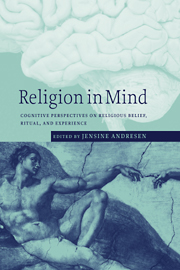Book contents
- Frontmatter
- Contents
- Notes on contributors
- 1 Introduction: towards a cognitive science of religion
- PART I BELIEF ACQUISITION AND THE SPREAD OF RELIGIOUS REPRESENTATIONS
- PART II QUESTIONING THE “REPRESENTATION” OF RELIGIOUS RITUAL ACTION
- 5 Ritual, memory and emotion: comparing two cognitive hypotheses
- 6 Psychological perspectives on agency
- 7 Do children experience God as adults do?
- PART III EMBODIED MODELS OF RELIGION
- Index
6 - Psychological perspectives on agency
Published online by Cambridge University Press: 02 December 2009
- Frontmatter
- Contents
- Notes on contributors
- 1 Introduction: towards a cognitive science of religion
- PART I BELIEF ACQUISITION AND THE SPREAD OF RELIGIOUS REPRESENTATIONS
- PART II QUESTIONING THE “REPRESENTATION” OF RELIGIOUS RITUAL ACTION
- 5 Ritual, memory and emotion: comparing two cognitive hypotheses
- 6 Psychological perspectives on agency
- 7 Do children experience God as adults do?
- PART III EMBODIED MODELS OF RELIGION
- Index
Summary
In previous work (Lawson and McCauley 1990), we showed that our theory of religious ritual competence makes substantive predictions about an array of features concerning religious rituals. We also argued that the representation of religious ritual action depends upon general cognitive mechanisms for the representation of action. We maintained that the representation of action requires the notion of agency, that the notion of agency involves the notion of agents in action, that such actions either may or may not involve patients, that our technical notion of religious ritual action requires the notion of patients, and, finally, that what distinguishes religious ritual actions from actions of all other kinds is that agents who appear in the structural descriptions of religious rituals possess special qualities. Aside from this notion of special qualities, the structural descriptions of religious ritual action typically possess the same features as do representations of ordinary actions.
Focusing upon the representation of action highlights both the continuities and differences between ritual action and actions of other kinds. The representation of an ordinary action, for example, a man washing a baby with water, would include information such as the facts that the man functions as the agent, washing is the action the agent performs, the baby occupies the role of the patient of the action, and water is the instrument. How does this representation differ from that of a religious ritual in which a priest baptizes a baby with water? On nearly all fronts, not very much. This religious ritual employs the same basic representational structure: A does B to C by means of D.
- Type
- Chapter
- Information
- Religion in MindCognitive Perspectives on Religious Belief, Ritual, and Experience, pp. 141 - 172Publisher: Cambridge University PressPrint publication year: 2001
- 6
- Cited by



